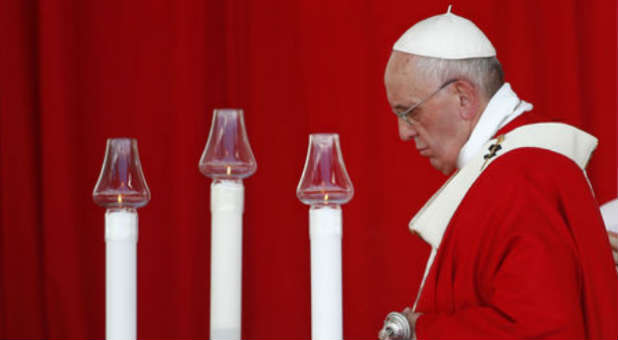Is the Pope Infallible?
It Has No Basis in History
The development of the papal office, which is not found in either Scripture or early Christianity, has been a long and problematic process that encountered much opposition along the way and was never accepted by all of Christendom. In fact, the ancient churches of the East (now known as the Eastern Orthodox) never accepted the authoritative claims of the bishop of Rome (the pope) in the West.
Just like small, independent charismatic churches today will often align themselves with a big-city, megachurch and its charismatic pastor, churches after the second century were willing to offer a certain honor and respect to the church in Rome because of its size and location in the capital of the Empire. But when attempts were made by Roman bishops to exercise authority over other churches, they were met with outright opposition.
To note just one example: When Cyprian (195-258), bishop of Carthage, had a dispute with Stephanas, the bishop of Rome, he accused Stephanas of introducing innovations into the church and thereby disrupting the church’s unity. The innovations Cyprian referred to were the Roman bishop’s claim of authority over churches in other regions.
Cyprian claimed equal dignity with Stephanas and addressed him as “dearest brother.” He also reproved Stephanas for the pursuit of power by the Roman bishops, saying, “No one should make himself a bishop of bishops.” He also admonished Stephanas to be teachable, saying, “It is no more beneath the dignity of a Roman bishop than any other man, to suffer himself to be corrected when he is in the wrong” (Eddie Hyatt, Pursuing Power, 65-66).
The Use of Forgeries to Gain Power
When Kung referred to the use of forgeries to buttress papal power, he was referring, in particular, to the Donation of Constantine, which was used, beginning in the eighth century, to further establish the preeminence of the Roman bishop. According to this fable, Constantine, the persecutor of Christians, was smitten with leprosy and then healed by Pope Silvester, who also converted him and baptized him.
According to this legend, when Constantine later decided to move the capital to Constantinople on his own initiative, realizing his sin, he came and prostrated himself before Silvester, and when his sin was forgiven, he moved the capital to Constantinople with the pope’s consent. According to this myth, before departing, Constantine then bestowed on Silvester the right to wear the Roman imperial insignia and robes, and bequeathed to him Rome and all the provinces and cities in Italy and the western regions.
In effect, Constantine had bestowed on the Roman bishop a kingly royalty and authority like that of an emperor over all the cities and churches of the West. In addition, the story implied that Constantine had received his authority for establishing the Byzantine empire of the East from the bishop of Rome. This was used by later popes to claim universal authority over all churches everywhere, even those of Byzantine.
It was not until the 15th century that this story was challenged by the Catholic official and historian Lorenzo Valla. The Donation of Constantine is now widely recognized, even by Catholic historians, as fictitious. Nonetheless, it served its purpose in providing a powerful argument for the medieval popes to further their claims of preeminence.
These facts, uncovered by Catholic historians, serve to demonstrate how the pomp and pageantry of the modern papacy is rooted, not in Jesus and the New Testament, but in ancient, imperial Rome.
The Historical Origin of Papal Infallibility
Although the bishops of Rome consistently expanded their claims of priority and authority from the 3rd century on, the idea of papal infallibility did not surface until the 13th century. Interestingly, it was rejected by the pope and the Catholic Church at that time.
We are indebted to the Catholic historian, Brian Tierney, who has demonstrated the origins of the doctrine of papal infallibility in his book, appropriately titled, Origins of Papal Infallibility. Tierney demonstrates that the doctrine was first proposed in the 13th century and rejected. He notes that the doctrine is not orthodox, and may even be considered “heterodox,” which is a polite way of saying “heretical.”
Tierney, who is an expert in medieval church history, documents that the idea of papal infallibility was first introduced around 1280 by an eccentric Franciscan by the name of Peter Olivi. Olivi had a particular reason for formulating this doctrine. Pope Nicholas III had issued a very favorable decree in regards to the Franciscans and Olivi wanted all subsequent popes to be bound to that decree.
This novel idea of popes being infallible was not taken seriously and when, 40 years later, the Franciscans tried to use it to force Pope John XXII to act favorably on their behalf, he issued a bull (official document) in which he condemned the doctrine of papal infallibility as “a work of the devil, the father of all lies” (Brian Tierney, Origins of Papal Infallibility, 186-96).
The idea of papal infallibility was then dropped except for a few dissident Franciscans who tried to use it to prove that John XXII was a heretic for not affirming the favorable ruling of his predecessor.
This means that there was no widespread acceptance of papal infallibility in the Middle Ages, nor during the time leading up to Vatican I, as its proponents have claimed. Tierney says,
There is no convincing evidence that papal infallibility formed any part of the theological or canonical tradition of the church before the 13th century; the doctrine was invented in the first place by a few dissident Franciscans because it suited their convenience to invent it; it was accepted by the papacy because it suited the convenience of the popes to accept it” (Tierney, Origins of Papal Infallibility, 281).














































